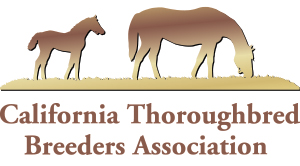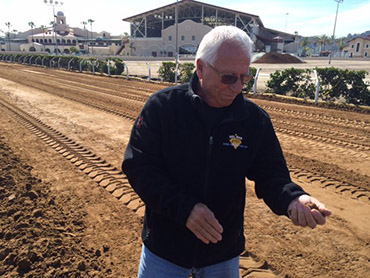By UTSandiego.com
DEL MAR, Calif. (May 17, 2015) — Del Mar was banging the drum loudly Wednesday about its reduced environmental footprint thanks to its use of recycled water and the recycling of all waste off its backstretch.
Considering the shortage of potable water in California due to the fourth year of drought and the state’s constant concern for the environment, what Del Mar and the 22nd District Agricultural Association are doing with water savings and a recycling program for backstretch waste is worth crowing about.
Del Mar will use even less recycled water this year thanks to a switch back to a dirt track that will require far less water than the old synthetic Polytrack, which had to be watered constantly to keep the temperature of the surface down and the materials manageable. Del Mar recently completed installation of a new dirt track, El Segundo sand imported from the Los Angeles Airport area, and it will be maintained with recycled water.
“We had our first horses on the new dirt track today, and they went over it well,” said Mac McBride, director of media for the Del Mar Thoroughbred Club. “Horses taking part in the Barretts two-year-old-in-training sale will be on it until the sale on May 28.”
McBride said Tedesco has been maintaining the new track for a week. After the Barretts sale, the track will be sealed, and the San Diego Fair takes over. The track will be re-opened July 6, the day after the fair ends, and horses will be on it following a few days of work. The summer meeting starts Thursday, July 16
In the meantime, DMTC officials are pointing to the millions of gallons of potable water that will be saved thanks to the track and the 22nd District Agricultural Association’s contract for recycled water with the San Elijo Joint Powers Authority in nearby Cardiff. DMTC and the 22nd DAA drew down approximately 160 acre feet this past year. An acre foot equals 43,560 cubic feet and is equivalent to 325,851 gallons. That’s the third most water used by any user supplied by San Elijo. Del Mar has been using recycled water for more than two decades, leading to its use of potable water dropping and use of recycled water increasing.
Water useage figures released by the 22nd DAA and DMTC show the increase of recycled water use over potable water in the last four years.
In 2011, potable water usage equaled 54,900 units (one unit is equal to 748 gallons). In 2014, that same usage has been lowered to 47,600 units, a decrease of 13%. As for reclaimed water, the 2011 units were 31,500. Since then that number has more than doubled to 67,700 units in 2014, a rise of 115 percent.
“Last year alone we saved about 60 million gallons of potable water,” said Leif Dickenson, DMTC’s turf/landscape superintendent. “Think about it this way: picture an acre of land; now fill it up 160 feet high with water. That’s 160 acre feet. That’s how much we saved and that’s a lot of water.”


